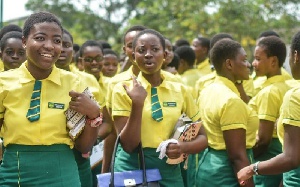 File photo of some SHS students
File photo of some SHS students
In spite of the consistent promises, assurances, explanations, and the release of GHC400m per term to fund the free senior high school SHS) programme starting 2017/2018 academic year, a lot of Ghanaians, especially the opposition NDC and IMANI Ghana, are skeptical about the funding and sustainability of the programme.
Their fear and probably the fear of many doubting Thomases is that, the new policy would not only double the student population, and consequently increase cost, but also put undue pressure on educational infrastructure at the secondary level.
To such people, there is a need for government to review the policy by allowing parents to pay for their wards' feeding in the boarding schools whilst the government uses the money to build and expand educational infrastructure.
In this sense, majority of junior high school (JHS) graduates could access secondary education as Day Students to enable the government absorb the fees without much difficulty.
But, the NPP government under President Nana Akufo-Addo holds a different view. The government is of the view that, the economy of Ghana could cater for all pupils who would pass the BECE in 2017 and be placed by the GES' Computerized School Selection and Placement System (CSSPS).
Although, I have argued that, this directive by the government is not a panacea to street children since not all pupils are academically gifted, there should be an alternative assessment at the end of JHS so that, other children who possess other types of intelligence other than academic - linguistic, bodily-kinesthetic, artistic, and musical could access Technical, Vocational and Commercial Schools without condition.
Admittedly, the proposed free SHS policy by the government is not an easy thing looking at the myriad of problems at the education sector and how successive governments have struggled to pay arrears of teachers, release funds for the Northern Scholarship Scheme and closing the infrastructural gap. But, as the late Bob Marley said; "Where there is a will, there is always a way".
For the free SHS programme to be successful, in my view, the government must first get a proper data on all our schools - Secondary, Technical, Vocational and Commercial with regard to the number, teacher/student population as well as the schools' infrastructural and logistical needs.
This would help identity and address the pertinent managerial problems facing heads of institutions at the secondary level. The government could then pay a lump sum of money to the school authorities based on their circumstances to cater for their recurrent expenditure.
Secondly, the government should review all fees charged on the students on termly basis. It is a common knowledge that, Heads of our educational institutions use the period as their cocoa season and bill students with items which most of the time have no direct relationship with academic work. Besides, parents must have the choice of buying and sewing the prescribed school uniforms, checks, house dresses from the open market instead of a single source.
The purchase of bangles, ties, school bags, vests, track suits must not be forced on the throats of parents. Again, chargeable items like library, computer laboratory, science resource centres, furniture etc must be scrapped. Why should students be charged for using the library, science resource centres, and furniture already paid for, but not the usage of classroom, football field and dining hall?
Thirdly and more importantly, the government should prioritise agriculture by resourcing farmers and other specialised group of people such as prisoners, national service personnel etc to produce more maize, rice, pepper, onion, palm oil, tomatoes etc to feed the boarding students.
This will reduce significantly the cost of feeding and put money in the pockets of our farmers as well. If we claim agriculture is the backbone of the Ghanaian economy, I don't see the reason why over 60% of the population involved the sector cannot produce enough to feed less than 1m students at the secondary schools.
The last but not least, the excesses of the Parent-Teacher Associations (PTA) must be checked. These PTAs, instead of collaborating with school authorities to improve academic work and discipline, have rather turned into taxing devices milking parents and guardians on termly basis. In some schools, PTAs continue to levy new entrants for the purchase of vehicles for more than five years. This is unacceptable and must not be tolerated.
In winding down, I would urge all Ghanaians to support this flagship policy. For, it is the fairest and simplest way of sharing the national cake since both the rich and the poor would benefit. If Ghana intends to make a positive mark in the comity of nations, then no child should be left on the street as a result of poverty, access or academic intelligence.
God bless Ghana! God bless the NPP!! God bless Nana Akufo-Addo!!!